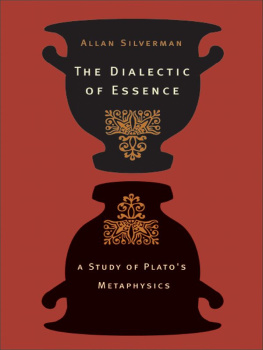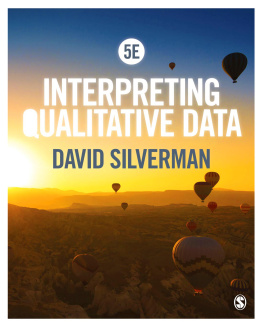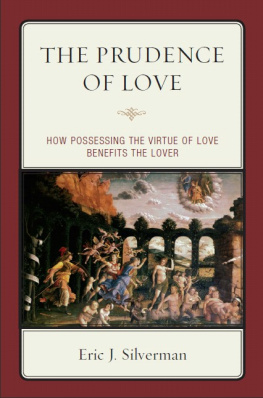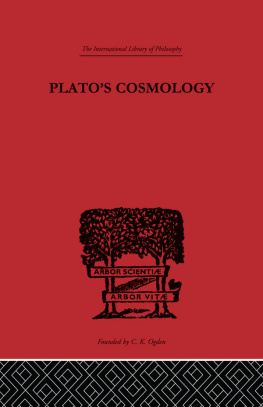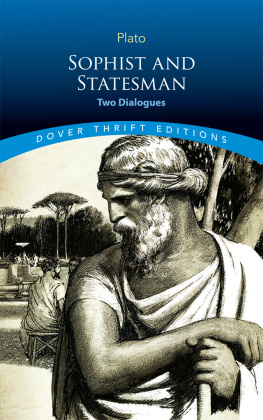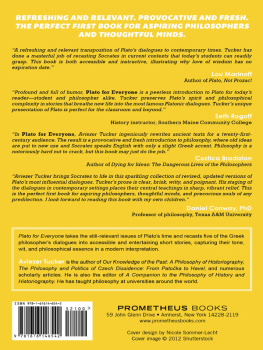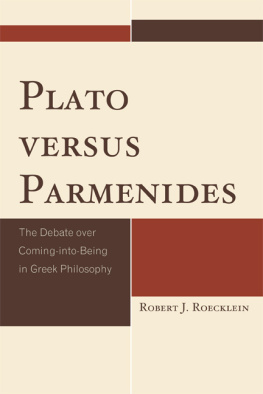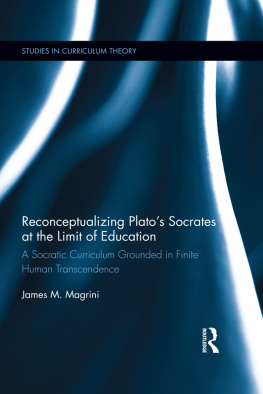THE DIALECTIC OF ESSENCE
THE DIALECTIC OF ESSENCE
ASTUDYOFPLATOSMETAPHYSICS
ALLANSILVERMAN
PRINCETON UNIVERSITY PRESS
PRINCETON AND OXFORD
COPYRIGHT2002 BY PRINCETON UNIVERSITY PRESS
Published by
Princeton University Press,
41 William Street,
Princeton, New Jersey 08540
In the United Kingdom:
Princeton University Press,
3 Market Place, Woodstock,
Oxfordshire OX20 1SY
All Rights Reserved
Library of Congress Cataloging-in-Publication Data
Silverman, Allan Jay.
The dialectic of essence : a study of Platos metaphysics / Allan Silverman.
p.cm.
Includes bibliographical references (p. ) and index.
eISBN: 978-1-40082-534-9
1. PlatoContributions in metaphysics. 2. MetaphysicsHistory. I. Title.
B398.M4 S55 2002
110.92dc212001059164
British Library Cataloging-in-Publication Data is available
This book has been composed in Minion
Printed on acid-free paper.
www.pupress.princeton.edu
Printed in the United States of America
10 9 8 7 6 5 4 3 2 1
CONTENTS
CHAPTER ONEAN OVERVIEW OF PLATIONI CMETAPHYSICS
CHAPTER TWOSOCRATIC METAPHYSICS?
CHAPTER THREETHE EMERGENCE OF FORMS
CHAPTER FOURREFINING THE THEORY OF FORMS
CHAPTER FIVETHEORY AND LANGUAGE
CHAPTER SIXNOT-BEINGS
CHAPTER SEVENTHE NATURE OF MATERIAL PARTICULARS
I
PREFACE
THIS IS and is not the book I wanted to write. I wanted to model my work on the books and articles of the various authors from whom I learned so much. I wanted to address the extensive ancient literature on Plato and the central topics of his metaphysics. I have fallen short on both counts. My greatest debts are acknowledged in the body of the book and notes. Were I not so prolix I might have been able to give proper respect to other approaches to Platos metaphysics. I wanted to discuss more topics, for instance Platos teleology, and to examine others better. Nonetheless, the book is what it is. Its failings are mine.
Some of the book dates back to a paper written for a Timaeus seminar taught by John Dillon at Berkeley in 1979. I have racked up enormous debts over the years, not least to all my teachers and friends at Berkeley. I was fortunate to have been able to work with Gregory Vlastos throughout my studies and to have assisted G.E.L. Owen during his memorable visit as Sat-her Professor. Donald Davidson kindly gave me a copy of his dissertation. I am also deeply indebted to my colleagues in the Departments of Philosophy and Classics at Ohio State, where I have been since 1985, for their tolerance, encouragement, and philosophy. The departments and the university as a whole have supported my research intellectually and financially. I am grateful to all. The Center for Hellenic Studies provided an ideal environment in which to work through a Junior Fellowship in 198889. My thanks go especially to Zeph and Diana Stewart. The idea to write the book took shape while I was a Visiting Professor at Yale in 1993 and 1994. I learned much from conversations with Bob Adams and others in New Haven. The National Endowment for the Humanities supported the actual beginnings of the book with a Fellowship in 199596.
Parts of chapters have been read at various placesNorthwestern, Purdue, Stanford, The University of Washington, UCLA. I thank the audiences on all those occasions for their comments.
I cannot count the individuals to whom I owe thanks: friends, students, colleagues, hosts, and visitors over the years. But there are some special debts to acknowledge. Bob Batterman, Sylvia Berryman, Lee Franklin, Peter King, George Pappas, Diana Raffman, William Taschek, and Neil Tennant have read or conversed with me about various parts of the book at Ohio State. I was abetted by conversations with June Allison, Dirk Baltzly, Simon Blackburn, Chris Bobonich, Myles Burnyeat, Marc Cohen, John Cooper, Pat Curd, Nick Denyer, John Dillon, Michael Ferejohn, Gail Fine, Charles Griswold, Adam Hayward, Verity Harte, Sally Haslanger, Richard Kraut, Jonathan Lear, M. M. McCabe, Connie Meinwald, Henry Mendell, Julius Moravcsik, Calvin Normore, Richard Patterson, Chris Rowe, Dory Scaltsas, Malcolm Schofield, Steve Tracy, Bob Turnbull, Nick Wolterstorff, and Steve Yablo. Mark Griffith, Tony Long, and David Sedley have been extraordinarily generous with their time and comments over long years of friendship. Robert Kraut has been a constant sounding board. Alexander Nehamas has supported this endeavor in numerous ways. My greatest debt by far is to Alan Code, an exemplary teacher, friend, colleague, reader, interlocutor, writer, and philosopher. I am sure there are others whom I have failed to mention. My apologies.
The manuscript was vastly improved by the comments of the anonymous readers for Princeton University Press. I was also fortunate to have Ian Malcolm as my editor and David Allen as my copy editor.
I cannot even begin to thank my family. My in-laws, Robert and Kit Corley, generously allowed me to use their cabin in the woods whenever I really needed isolation. My father, who passed away when I was just beginning to write, and my mother have always been there in all of my pursuits. Words fail me when I try to appropriately thank my children, Alexander and Elena, and my wife, Ann. The book is dedicated to them.
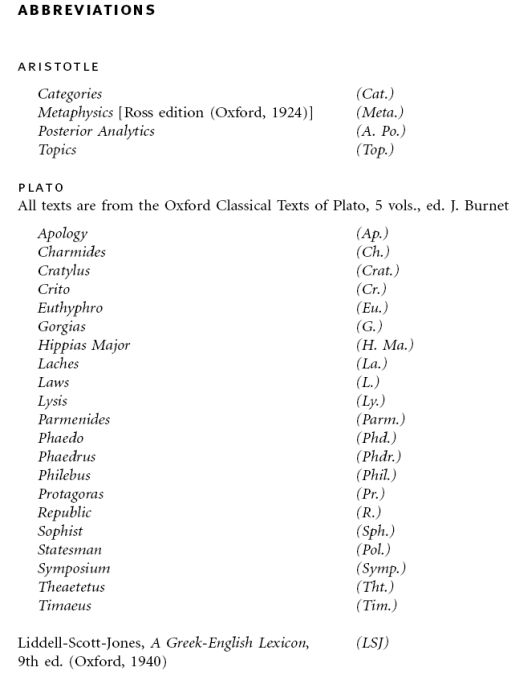
THEDIALECTICOFESSENCE
INTRODUCTION
How ought one to live? I take this question to be the starting point for Platos philosophy, his Platonism. No doubt others before him asked it: Socrates for one. But it is not the mere posing of the question that makes it so special. Rather, it is the manner in which Plato considers it. In his hands it calls for reflection, and reflection of a certain, increasingly systematic variety. Plato thinks that systematic reflection, what he and we call philosophy, shows that this question can be answered. Indeed, philosophical reflection reveals that philosophy itself, the practice of philosophizing, is the answer to the question.
From this starting point spring his ethics, epistemology, and metaphysics. For Plato, these domains are interdependent. Plato is rightly honored for his synoptic vision, his power to see systematic connections between different parts of life, science, the arts, and philosophy. If the question is, broadly speaking, part of ethical inquiry, his answer requires the development of much of his metaphysics and epistemology.
My aim in this work is to explore Platos metaphysics. The book has three parts, modeled on what I believe to be the three key elements of his meta-physics: the Theory of Forms; the account of particulars; and the nature of metaphysical theory itself.
At the core of Platos entire philosophy is the Theory of Forms. For Plato, Forms are both the goal and the grounds of philosophical inquiry. In seeking to answer the question of how ought one to live, Plato thinks that we come ineluctably to recognize their presence, in part through the realization that they are needed if one is to engage in any inquiry at all.
Thus while I will try to steer clear of most of his ethics and much of his epistemology, I cannot avoid the epistemology entirely. The fact that reflection is a critical component of the best way to live ensures that epistemology will be in play from the outset. The capacity for reflection is distinctive of humans. Reflection presupposes that we take objects or states of affairs, including our own mental states, e.g., beliefs, perceptions, or feelings, as fixed in some sense, so that we may examine and think about them. The assumption that the world is a certain determinate way, constant and fixed to some degree, was as much a part of the Greek world view as it is of our own. Platos philosophy is predicated on the notion that the cosmos of which we are an integral part is rationally ordered and (therefore) in principle intelligible to us.
Next page
